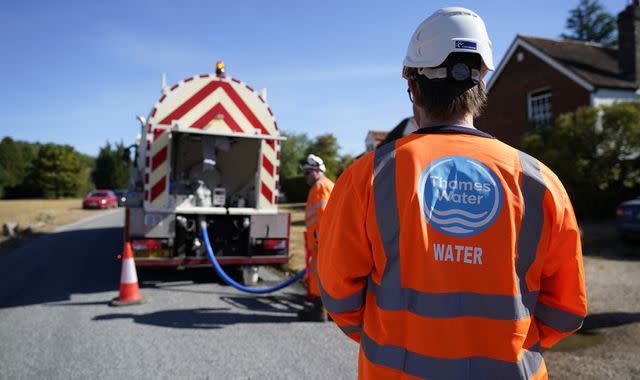Thames Water: Sunak and Starmer will both be dreading the most likely option for utility at risk of collapse

Whoever wins the general election, one potential headache for the new administration will be Thames Water.
The current government has already drawn up contingency plans, known as Project Timber, for the possible collapse of a company currently saddled with debt of £15.4bn.
A possible collapse of Thames also features strongly on a dossier of potential crises compiled by Sue Gray, Sir Keir Starmer's chief of staff, that an incoming Labour government would face.
Money latest:
Man Utd staff 'given week to resign' in WFH crackdown
Talk of a possible collapse has moved up the agenda because Thames Water's owners, which include the Canadian pensions giant Omers, the Universities Superannuation Scheme (USS), a unit of the Abu Dhabi Investment Authority and the China Investment Corporation, have declined to inject more equity into the business.
They had previously offered to inject a further £3.25bn, on top of £500m injected last year, were Ofwat, the regulator, to support the company's plans.
But Ofwat is refusing to allow Thames to raise its levels of investment and customer bills to the extent that the company is proposing.
Thames had asked Ofwat to approve an £18.7bn investment which would have entailed a 44% average increase in customer bills over the next regulatory period due to run from 2025-2030. It tweaked this submission in April to raise investment to £19.8bn during the period with no extra increase in bills.
Ofwat was due to publish its 'final deliberation' on investment plans and customer bills for the entire water industry, including Thames, on 12 June but has moved it back to 11 July due to the general election.
The Guardian reported earlier this week that Ofwat is set to refuse the requests of most water companies, including Thames, with some operators being allowed to raise bills by as little as half of what they had asked for.
Such an approach is consistent with Ofwat's historic approach of keeping water bills low as its main priority rather than, for example, permitting higher investment to tackle sewage spills.
However, there are signs that Ofwat may be prepared to compromise, at least to an extent.
Avoiding nationalisation?
The Financial Times reports today that the regulator is drawing up plans for a special "recovery regime" for Thames and other financially stressed UK water companies in a bid to avoid nationalisation.
It suggests that companies with "recovery regime" status could receive fewer or no regulatory penalties to encourage them to invest in infrastructure improvements instead, as well as being given more "realistic" targets for reducing sewage and water leaks and outages.
Ofwat, needless to say, is not commenting. But the fact that the FT has attributed its story to "people close to Ofwat and the water companies" is significant here.
It suggests that someone in Ofwat is willing to let it be known that the regulator is open to proposals that avoid Thames being nationalised and its debts transferring to the public.
A dilemma for Ofwat
It also speaks to the dilemma in which the regulator finds itself.
Ofwat does not want Thames to collapse, not least because such an event would intensify criticism that the regulator allowed Thames's previous owners - most notably the Australian investment bank Macquarie - to load the company with debt while extracting enormous dividends (the current investors have received no dividends since 2017).
Ofwat's ministerial overlords - of both parties - will also be aware that an administration of Thames would deter the very international investors the UK desperately needs to attract to pay for infrastructure improvements.
On the other hand, though, Ofwat does not want to face accusations that it is being unduly lenient on a company that has been badly behaved in the past.
Yet it also wants businesses like Thames to continue investing in water infrastructure.
Read more from Sky News:
'Czech Sphinx' set to take over Royal Mail
Labour extends lead over Tories - exclusive poll
Compromise may not be enough
Now it is fair to say that Ofwat is offering an olive branch here.
Only two weeks ago, it said it was "minded" to punish Thames for breaching licence conditions over a £37.5m dividend paid to shareholders in October last year (Thames points out the payment was made to Kemble Water, its parent holding company, and was necessary to maintain the latter's solvency).
That could result in another fine worth tens of millions of pounds.
The big question is whether this compromise will be enough to shore up Thames's financial situation. Ofwat has fined Thames £175m during the last three years which, while being a large sum, is a relatively trifling amount set against Thames's debts.
To put it in context, Thames spent £208.7m servicing debts in the six months to September 2023 alone.
So it probably would not be enough, of itself, to persuade Thames's owner to pump more equity into the business.
Omers, the biggest single shareholder in Thames, has already written down the entire value of its 31.7% stake in the company to nothing.
USS, which has more than half a million scheme members in British universities and which owns nearly 20% of Thames, has written down the value of its shareholding from £956m at the end of 2022 to just £364.4m as of the end of last year.
Both sides bought time - but patience running out
What today's news reveals is that there is a compromise to be reached here.
The extra month before Ofwat is due to publish its draft deliberation has bought both sides a little more time.
But it feels as if, with Ofwat in no mood to back down with Thames over its proposed increase in investment and customer bills, the latter's shareholders have run out of patience.
A 'special administration' of Thames - something neither Rishi Sunak nor Sir Keir would want to see - still feels like the way to be betting.


